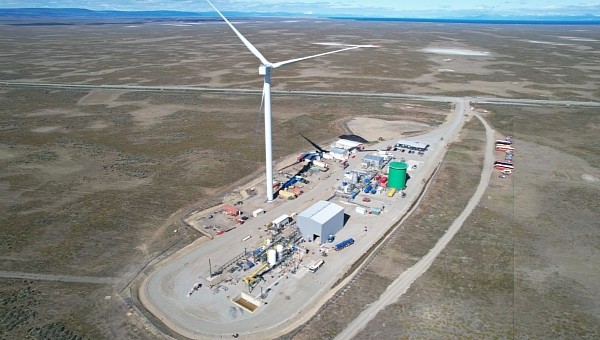Thank goodness there is a major automotive manufacturer not totally consumed by the electric vehicle movement that has its eyes open wide enough to explore alternative fuels in order to keep ICE-powered cars on the road and safe from extinction.
That company is no other than sports carmaker Porsche, the now publicly traded entity under the Volkswagen AG umbrella.
Just yesterday, December 20, the company celebrated the opening of a pilot plant in Chile that produces synthetic fuels, with a ceremonial filling up of the tank of a Porsche 911 with the fuel produced at the site.
The e-fuel produced at the ‘Haru Oni’ pilot plant in Punta Arenas, Chile, is created from water and carbon dioxide, using wind energy that enables internal combustion chamber engines to operate at near carbon-neutral levels.
“Porsche is committed to a double-e path: e-mobility and eFuels as a complementary technology. Using eFuels reduces CO2 emissions. Looking at the entire traffic sector, the industrial production of synthetic fuels should keep being pushed forward worldwide. With the eFuels pilot plant, Porsche is playing a leading role in this development,” says Barbara Frenkel, Member of the Executive Board for Procurement at Porsche AG.
Unless the powers that be totally ban the operation of ICE-powered automobiles, the 1.3 billion that are on the road today will be able to operate in an environmentally conscious manner. Porsche used their expansive knowledge of fuels picked up from developing high-performance and efficient engines to come up with this miracle fuel.
How ironic is it that the plant is located in Chile? After all, Chile holds the world's largest reserves of lithium. Lithium is a metal that is a vital component in the batteries that are relied upon to power today's electric vehicles.
But, in fact, Punta Arenas, Chile, was chosen as the ideal location to utilize wind power to produce the eFuel because the area is subjected to winds about 270 days per year, allowing the wind turbines to operate at maximum capacity. The eFuel facility is also near the port of Cabo Negro which will allow the fuel to be distributed using existing infrastructure.
Porsche, along with other global partners and the Chilean operating company Highly Innovative Fuels (HIF) put together the pilot program that will initially produce 130,000 liters (34,342 gallons) of e-Fuel annually which will be used in lighthouse projects such as the Porsche Mobil 1 Supercup and at Porsche Experience Centers.
Once the pilot phase is complete, production will scale up to 55 million liters (14.5 million gallons) per year by 2025 and reach 550 million liters (145 million gallons) shortly thereafter.
Porsche is heavily invested in the research and production of eFuels to the tune of over $100 million and they are a big part of the car manufacturer’s sustainability strategy.
Just yesterday, December 20, the company celebrated the opening of a pilot plant in Chile that produces synthetic fuels, with a ceremonial filling up of the tank of a Porsche 911 with the fuel produced at the site.
The e-fuel produced at the ‘Haru Oni’ pilot plant in Punta Arenas, Chile, is created from water and carbon dioxide, using wind energy that enables internal combustion chamber engines to operate at near carbon-neutral levels.
“Porsche is committed to a double-e path: e-mobility and eFuels as a complementary technology. Using eFuels reduces CO2 emissions. Looking at the entire traffic sector, the industrial production of synthetic fuels should keep being pushed forward worldwide. With the eFuels pilot plant, Porsche is playing a leading role in this development,” says Barbara Frenkel, Member of the Executive Board for Procurement at Porsche AG.
Unless the powers that be totally ban the operation of ICE-powered automobiles, the 1.3 billion that are on the road today will be able to operate in an environmentally conscious manner. Porsche used their expansive knowledge of fuels picked up from developing high-performance and efficient engines to come up with this miracle fuel.
How ironic is it that the plant is located in Chile? After all, Chile holds the world's largest reserves of lithium. Lithium is a metal that is a vital component in the batteries that are relied upon to power today's electric vehicles.
But, in fact, Punta Arenas, Chile, was chosen as the ideal location to utilize wind power to produce the eFuel because the area is subjected to winds about 270 days per year, allowing the wind turbines to operate at maximum capacity. The eFuel facility is also near the port of Cabo Negro which will allow the fuel to be distributed using existing infrastructure.
Porsche, along with other global partners and the Chilean operating company Highly Innovative Fuels (HIF) put together the pilot program that will initially produce 130,000 liters (34,342 gallons) of e-Fuel annually which will be used in lighthouse projects such as the Porsche Mobil 1 Supercup and at Porsche Experience Centers.
Once the pilot phase is complete, production will scale up to 55 million liters (14.5 million gallons) per year by 2025 and reach 550 million liters (145 million gallons) shortly thereafter.
Porsche is heavily invested in the research and production of eFuels to the tune of over $100 million and they are a big part of the car manufacturer’s sustainability strategy.





